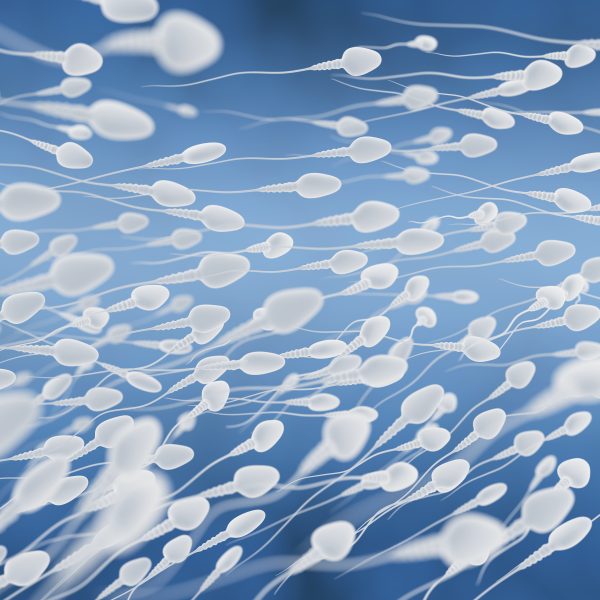A 2014 observational study published in the journal Fertility and Sterility has concluded that obesity in men contributes to a decrease in sperm health and male infertility.
Study Purpose: To compare the spontaneous and protein-induced acrosome reaction of the sperm of obese versus lean men.
Participants: 23 morbidly obese men with a BMI >36kg/ms2 being evaluated for bariatric surgery at the Metabolic and Bariatric Surgery Unit of Careggi University Hospital in Florence, Italy, compared with 25 lean men of the same age (volunteers or men undergoing semen analysis for infertility – the only inclusion criteria being age) with a 20 kg/m2 < BMI <25 kg/m2.
Determining Sperm Health: Each participant gave blood and semen samples.
2. Semen was collected on the same day or within one week of the blood sample to evaluate sperm morphology, motility, cholesterol levels and the acrosome reaction (on 100 viable sperm per slide). The presence of the sperm health issues of azoospermia, oligozoospermia and asthenozoospermia were evaluated as well.
Important facts: The physiologic, natural reaction that allows a sperm to penetrate and fertilize an egg is called the acrosome reaction (AR).
The AR happens in the zona pellucida (glycoprotein-rich outer layer) of an egg. A healthy sperm, close in proximity to an egg, will release an enzyme from the acrosome layer of its head to help it penetrate the zona pellucida for fertilization.
The AR must happen at a specific time. If the AR happens spontaneously too early, the sperm’s ability to penetrate is weakened or diminished entirely, decreasing its ability to fertilize an egg.
Scientists are finding that when a sperm experiences spontaneous AR before trying to penetrate the egg, it appears the remainder of the sperm in the ejaculate may not be able to respond to the protein present to help them fertilize the egg.
Conclusion: The sperm of obese men experience elevated instances of spontaneous AR and reduced responsiveness to protein from the egg that allow sperm to properly penetrate it.
In addition, the effect of obesity on sperm health and male fertility has been determined by this study to lead to…
- high prevalence of secondary hypogonadism
- decreased circulating total testosterone in the presence of low or normal gonadotropin
- increased levels of E2 or estradiol
- increased incidence of high cholesterol (statistically significant)
- increased prevalence of diabetes – 32% in the obese group and 0% in the lean group
- DNA fragmentation (noted in this report, but from a previous animal study)
- Decreased semen quality
Study authors share, “when sperm ability to undergo AR was evaluated, we found that capacitated spermatozoa of obese patients displayed a spontaneous level of AR significantly higher compared with the lean subjects. Moreover, the physiologic response to P was impaired in spermatozoa from obese compared with lean subjects… the two main features characterizing spermatozoa of obese in this metabolic pathway.”
Commentary
The impact of obesity in men on sperm health is largely disputed among researchers. What is becoming clearer, as more studies are published, is that obesity leads to hormone imbalance – low testosterone levels and higher levels of estrogen – which can contribute to less-than-optimal sperm health and male fertility health issues. Abnormal sperm contributes to infertility by increasing the risk for miscarriage and DNA or chromosomal defects in a developing embryo. Obesity often contributes to male sexual dysfunction as well.
Obese men who are wanting to conceive a child need to begin making changes to their diet and lifestyle. Lowering their BMI by eating smarter and reducing negative lifestyle choices can change their health for the better and impact fertility health positively. Reducing their BMI to less than 30 will help them to impregnate their partner, prevent miscarriage and have a healthy baby. Consider referring to the following resources for support…
Low Testosterone in Men – What You Should Know
Improving Men’s Fertility
Male Fertility Diet
Male Fertility Resources
- Samavat, J., Natali, I., Degl’Innocenti, S., Filimberti, E., & Cantini, G., et al. (2014, September 14). Acrosome reaction is impaired in spermatozoa of obese men: A preliminary study. Fertility and Sterility. Retrieved from http://www.fertstert.org/article/S0015-0282(14)01889-5/fulltext DOI: http://dx.doi.org/10.1016/j.fertnstert.2014.07.1248





